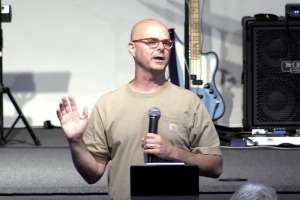Growth in Orthodox Christian Faith has Roots in 'Global South'
We are witnessing a global surge in Christianity. While there was a day when it looked like Christianity might disappear in Western Europe, we are in the midst of an earthshaking transformation of the Christian faith there. And surprisingly enough, its origins are in what is now known as the "global south."
I was in Europe in 1999 and saw a copy of the European edition of Time magazine that actually asked the question, "Is Christianity becoming extinct in Western Europe?" The writer specified Western Europe because Christianity seemed to be flourishing in parts of Eastern Europe. It was only in Western Europe—France, Belgium, Luxembourg, the Netherlands, Germany, Italy, Switzerland and the Scandinavian countries—where it appeared Christianity might be literally disappearing.
Yet a May 16 Washington Post story (Missionaries in Northern Virginia) indicates things are changing. We've heard the news about the impact of Muslim immigrants on Western Europe, but Christians also are immigrating to Europe from Africa, Asia and Latin America.
"The intense, irrepressible Christianity of the global south is becoming—along with Coca-Cola, radical Islam and Shakira—one of the most potent forms of globalization," writes former Bush administration official Michael Gerson in the Post article, noting there are now more Presbyterians in Ghana than in Scotland. Latin America, South America, Africa and Southeast Asia comprise what is now referred to as the "global south."
In Denmark, of all places, Christian immigrants have started more than 150 churches, according to a June 11 Washington Post story (Foreign missionaries find fertile ground in Europe). The members of these churches are not just ministering and evangelizing in the local immigrant communities; they are going out and seeking to evangelize everyone, including native-born Danes.
There was a day when Europe was the "global center of Christianity" and missionaries traveled out to share their faith, the article says. But what has been more recently a moribund Christian faith in Western Europe is being reinvigorated by Christian immigrants—the Post calls them "reverse missionaries"—coming from other countries around the world.
Chuck Colson, in a recent BreakPoint commentary, observed that the church in Europe needs these immigrant churches because they are bringing a message believers in Europe have forgotten. A Lutheran bishop in Denmark called the immigrant Christian churches "a gift to our Danish Lutheran church" because the churches are helping Danes understand how Christians should live.
Churches in Nigeria, Guyana, South Korea and the Philippines have sent thousands of missionaries to Europe to set up churches in homes, office buildings and storefronts. African-Anglican bishops are reaching out to conservative congregations in the United States who are breaking away from the apostate Episcopal Church in the United States, Colson noted.
It is the orthodox conservative churches in the Anglican Communion in the second and the third worlds that are holding the liberals' feet to the fire in Great Britain, Canada and the United States. Episcopal churches in America that cling to traditional, conservative beliefs are finding a haven in the Anglican churches led by African bishops.
The Post reports a convert to the revived faith in Denmark said the "state church," as the Lutheran church is called, placed a "higher value on order and ancient traditions than on tending to the concerns of parishioners."
Colson pointed out that Phillip Jenkins, a professor of history at Penn State University, chronicles the rise of what he calls "the next Christendom" in his book, The New Faces of Christianity: Believing the Bible in the Global South.
He points out that for the first time since the Christian faith went to Europe and Europe supplanted the Near East as the locus of the vast majority of Christians, 60 percent of the two billion Christians in the world live in Africa, Asia or Latin America. By 2050 there will be an estimated three billion Christians in the world. That means the Christian faith will grow by a billion persons in the next forty-three years, if current trends continue. This is a faster rate than the projected increase in the global population.
Of those three billion estimated Christians that will be alive in 2050, 75 percent will live in the "global south." One of the results will be that for the first time in the history of the Christian faith, the majority of the Christians in the world will not be Caucasian, but people of color.
But these numbers are only part of the story. These southern Christians, if you will allow me to use that term, have a much stronger belief in the authority of Scripture than their Western European and North American counterparts. As a Kenyan bishop said, "Our understanding of the Bible is different from them, we are two different churches."
While their detractors call them simple Biblicists, I view them as traditional, orthodox Christians intent on reshaping the world.
There is a wonderful story of a British Anglican bishop remonstrating with a Nigerian Anglican bishop a couple of years ago at a worldwide Anglican conference. The British bishop was saying, "But you can't just take the Bible simply like that. You have to employ higher criticism and scholarship, etc." To which the African bishop responded, "If you didn't believe the Bible, then why did you bring it to us in the first place?"
The global surge of Christianity has washed over America's shores as well. The United States has spiritual needs of its own, with large sections of the country desperately needing a vibrant biblical witness. South Korean Christians are sending hundreds of missionaries to the U.S., as well as to Europe.
A wonderful byproduct of the sacrifices made by those who fought for the freedom of the South Koreans in the Korean War is that South Korea has quietly become the most Christian nation in the world in terms of the percentage of its population who profess the Christian faith. Their missionaries are not just seeking to evangelize in Korean communities in the U.S.; they are seeking to bring the Good News to all Americans.
____________________________________________________________
Dr. Richard Land is president of The Ethics & Religious Liberty Commission, the Southern Baptist Convention's official entity assigned to address social, moral, and ethical concerns, with particular attention to their impact on American families and their faith.



























